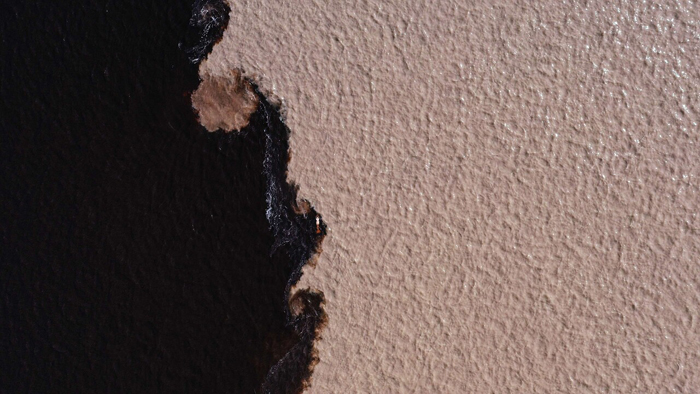Press Release
Emilija Škarnulytė: Æqualia
Canal Projects is pleased to present Æqualia (2023) a new immersive installation by artist Emilija Škarnulytė (Vilnius, b. 1987) opening January 19, 2024. Co-

International Archives 1st half of 2024
Emilija Skarnulyté and Adrian Balseca
Canal Projects, New York (United States)
19.01 - 30.03.2024

In the video, the artist submerges viewers in the confluence where Rio Solimões and Rio Negro gives birth to the Amazon River. Rio Solimões’s milky white waters, turbid with suspended silts and clays from the High Andes collides against the black and heavy flow of Rio Negro, dark with the decay of lowland rainforests. The stark difference in temperature, between the icy mountain water of the Rio Solimões and the warm Amazonian flow of Rio Negro, causes the two rivers to remain distinct in color for a six-
In Æqualia, Škarnulytė presents the protagonist of the mermaid –bridging the human consciousness with the unknown depths of nature. Acting as a new species, the mermaid depicts a mythical being in a post-
Emilija Škarnulytė (b. 1987) is a Lithuanian-
Adrian Balseca: Routing Rubber
Canal Projects will also host Ecuadorian artist Adrián Balseca’s (Quito, b. 1989) research on the plantation rubber industry. In ROUTING RUBBER, the artist challenges the idea of the Amazon as a natural horizon, centering this territory as the origin of industrial modernity. The black and white 16mm film, The Skin of Labour (2016) and its accompanying archive challenge the trope of the Amazon as a site of endless biodiversity and provides a view of the environment that is conditioned by the rules of the free market. These perspectives are, however, not mere portrayals of anthropogenic landscapes. Instead, they depict “nature” as a construct that is shaped by both colonial histories and the modern-
The Skin of Labour depicts a stylized perspective of the extraction of liquid rubber from incisions in the tree bark. In its evocation of early media technologies Balseca’s work illuminates the transformation of the Amazon forest into a project of resource administration, land domestication, and organized labor. The archive, though an unofficial and partial collection of period ephemera, includes manuals and promotional pamphlets published by The Goodyear Tire and Rubber Company, The Pan American Union, and the 1939 New York World’s Fair. These historical materials visually link the incision patterns of rubber tapping with the growth of the automobile industry in the United States.
Balseca’s practice broadly focuses on South America’s extractive histories and contemplates their environmental impacts. Producing installations, photographs, and objects, the artist probes trajectories of economic exploitation that allow for reflections upon the physical, economic, and epistemic violence contained within the modes of production of multinational capitalist networks. Often beginning with site-
Emilija Škarnulytė, Æqualia (still), 2023. Single-

Exhibition 19 January -

© ArtCatalyse International / Marika Prévosto 2024. All Rights Reserved